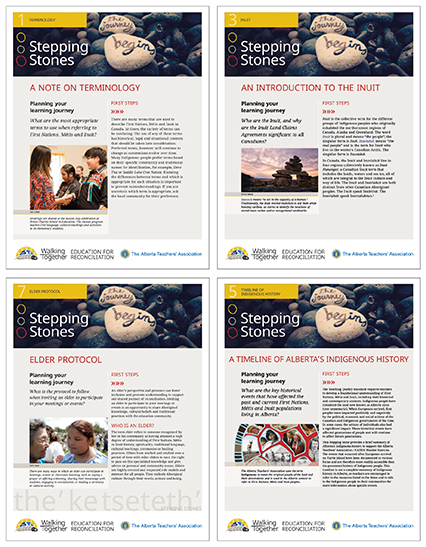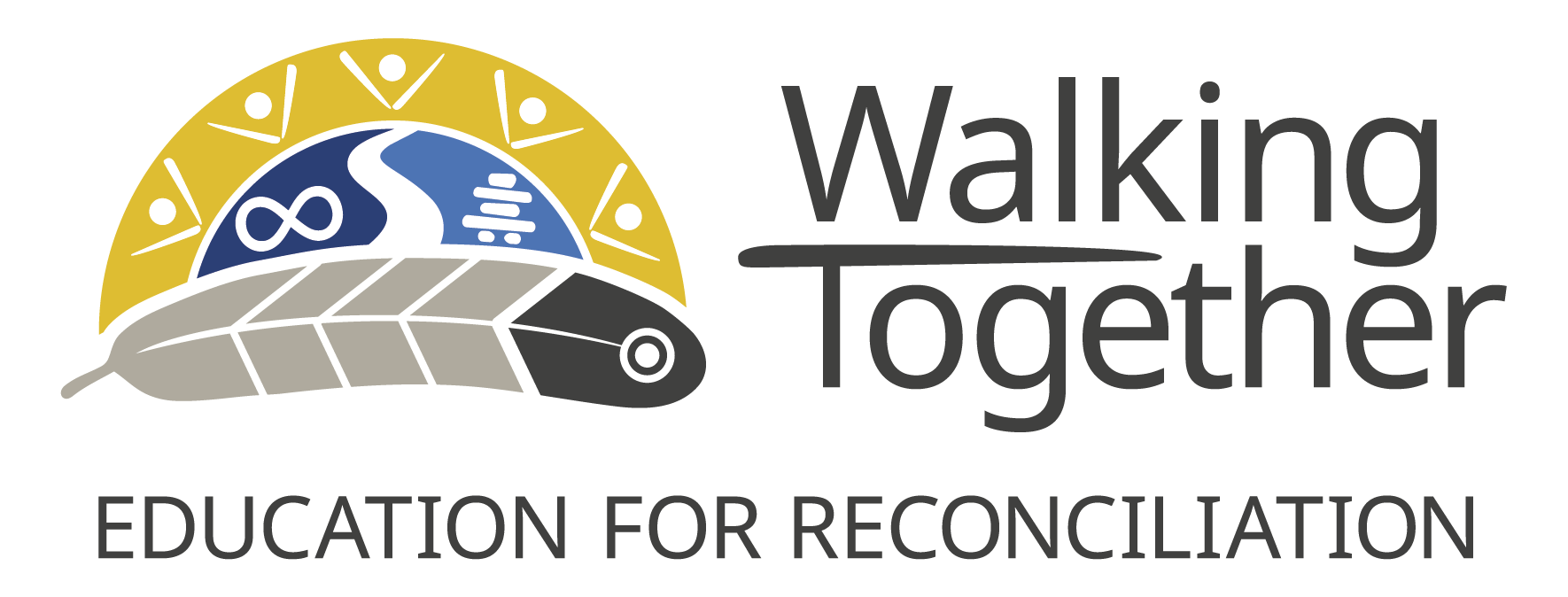Page Content
ATA’s Stepping Stones series helps pave the way to reconciliation while supporting a new teaching standard
In 2008, then prime minister Stephen Harper issued a formal apology to residential school students and their families for the federal government’s role in residential schools. It was a historic step toward “forging a new relationship between Aboriginal peoples and other Canadians.” Since then, many individuals, groups and organizations have taken many steps in that same direction, including the Alberta Teachers’ Association.
The Association is extremely proud to be able to provide Alberta teachers with resources and workshops that give a truly authentic picture of the history, culture and experiences of this province’s Indigenous people.
– Greg Jeffery,
ATA president
|
Stepping Stones is a series of concise and fact-filled summaries that take teachers on a learning journey of First Nations, Métis and Inuit foundational knowledge. Introduced by the Association in 2017, it covers everything from essential terminology to key historical events that have affected the past and current Indigenous populations living in Alberta. More than an interesting read, the information in the series is designed to help teachers meet new competency requirements expected in Alberta’s new Teaching Quality Standard.
 |
Andrea Berg,
ATA executive staff officer |
“It is anticipated the new provincial Teaching Quality Standard will require teachers to develop and apply foundational knowledge about First Nations, Métis and Inuit people to benefit students and support the process of reconciliation — Stepping Stones was developed with this requirement in mind,” explained Andrea Berg, the executive staff officer who heads up the Association’s Walking Together: Education for Reconciliation project, of which Stepping Stones is a part.
The Walking Together team consists of six consultants, all experienced classroom teachers with strong knowledge, experience in Indigenous education and backgrounds representing all three of Alberta’s treaty areas and the Métis community. The team has engaged local Indigenous communities by establishing regional advisory committees that include representation from elders and local knowledge keepers. This approach ensures that Stepping Stones and the other professional development programs and resources developed include regionally specific content for teachers.
“The work our Walking Together team has produced is informative, insightful and fascinating,” said ATA president Greg Jeffery. “The Association is extremely proud to be able to provide Alberta teachers with resources and workshops that give a truly authentic picture of the history, culture and experiences of this province’s Indigenous people.”
Downloadable PDF versions of the Stepping Stones summaries are available to teachers on the ATA website. French-language versions of each summary also are available or currently in the process of being translated.
 |
Stones steeped in history
 The Stepping Stones series and the other ATA Walking Together programs and resources are tools to help teachers acquire the foundational knowledge they need to meet the new Teaching Quality Standard and strengthen relationships with Indigenous students and their families. The Stepping Stones series and the other ATA Walking Together programs and resources are tools to help teachers acquire the foundational knowledge they need to meet the new Teaching Quality Standard and strengthen relationships with Indigenous students and their families.
In the hands of Alberta teachers, they are also a continuation of history in Canada, a few more steps towards the goal of reconciliation.
View and download Walking Together resources.
|

History still in the making
1883 — Federal government and churches run by Christian missionaries together begin operating residential schools in Canada to educate and convert Indigenous youth and to integrate them into Canadian society. Students were removed from their homes and parents, separated from some of their siblings and in some cases forbidden to speak their first language even in letters home to their parents. Many students were physically and sexually abused.1
1980s & 90s — Former residential school students launch legal campaigns to push the government and churches to recognize the abuses of the system, and to provide some compensation.1
1996 — Last residential school in Canada, Gordon Residential School in Punnichy, Sask., closes.1
1998 — Government of Canada issues Statement of Reconciliation acknowledging the abuses suffered by residential school students.1
2003 — Alternative Dispute Resolution process established to provide an out-of-court mechanism for determining residential school student compensation and offering psychological support.1
2007 — Indian Residential Schools Settlement Agreement recognizes the damage inflicted by the residential schools, creates a multi-billion-dollar fund to help former students in their recovery and establishes the Truth and Reconciliation Commission (TRC).1
2008 — Prime Minister Stephen Harper, on behalf of the Government of Canada, issues to the students of Canada’s residential schools and their families a formal apology for the role it played in residential schools.1
Truth and Reconciliation Commission (TRC) launched with the “intention to be a process that would guide Canadians through the difficult discovery of the facts behind the residential school system,” and meant to lay the foundation for lasting reconciliation across Canada.1
December 2015 — Final TRC report, Honouring the Truth, Reconciling for the Future, is released, documenting the tragic experiences of approximately 150,000 Canadian residential school students. Prime Minister Justin Trudeau commits to implementing all 94 of the recommendations made by the Commission.1
June 2016 — Alberta Education, the National Centre for Truth and Reconciliation, the Alberta Teachers’ Association and four other stakeholder organizations sign a Joint Commitment to Action to ensure all K–12 teachers receive additional training related to First Nations, Métis and Inuit history and culture within two to three years.
September 2016 — To fulfil its obligation to the Joint Commitment to Action, the Association establishes its Walking Together: Education for Reconciliation project.
- www.thecanadianencyclopedia.ca
-
Woodruff / Library and Archives Canada / PA-040715
-
The Canadian Press / Fred Chartrand
-
The Canadian Press / Adrian Wyld
